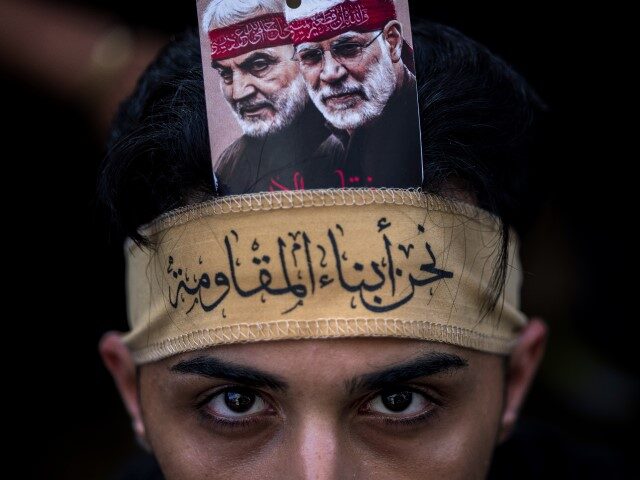Iranian Proxy in Iraq Allegedly Announces, then Denies, Campaign Against U.S. Troops
 Hassan Ammar/AP
Hassan Ammar/AP
Messages surfacing on the social media application Telegram on Monday both claimed and denied the Iranian terror proxy Kata'ib Hezbollah would resume attacks on American troops in its home country of Iraq, leaving unclear the intentions of the group.
Kata'ib Hezbollah, or the Hezbollah Brigades, is one of Iran's most powerful proxy terrorist groups in Iraq. It is a prominent member of the Popular Mobilization Forces (PMF), a group of mostly Shiite, Iran-backed militias that Baghdad legalized and integrated into its armed forces at the height of the war against the Sunni Islamic State “caliphate.” Kata'ib Hezbollah is also believed to be part of a coalition of terrorists known as the “Islamic Resistance in Iraq,” which debuted following the harrowing invasion of Israel by Iran-backed Hamas terrorists on October 7. The “Islamic Resistance in Iraq” has never clarified who its leadership is, what groups belong to it, or where exactly it operates.
Under the “Islamic Resistance in Iraq” banner, Kata'ib Hezbollah is believed to have played a role in the killing of three American service members in a drone strike on the Syrian-Jordanian border in late January, the first American deaths in the region since October 7.
The terrorist organization had issued a statement that month asserting it would “keep supporting Gaza and the Israeli-occupied Palestine [sic] while conducting painful attacks on US occupation forces until they are driven out of Iraq and the region.” Then, abruptly, on January 31 a message appeared on Telegram attributed to Kata'ib Hezbollah leadership claiming that the terrorists would stop attacking American forces “in order to prevent embarrassment of the Iraqi government.”
— Breitbart News (@BreitbartNews) March 18, 2024
In February, Reuters reported, citing a long list of anonymous sources, that Iran had ordered its Iraqi proxies to steer clear of attacks on Americans out of fear that Washington would respond by targeting Tehran's senior terror leaders. The order allegedly came from Esmail Qaani, the head of the Quds Force, the foreign terrorist unit of Iran's Islamic Revolutionary Guard Corps (IRGC). Qaani took the job in 2020 after the administration of President Donald Trump conducted an airstrike eliminating his predecessor, Qassem Soleimani, and the founder and leader of Kata'ib Hezbollah, Abu Mahdi al-Muhandis.
Multiple media outlets, including Iranian state outlets such as the Islamic Republic News Agency (IRNA), reported on Monday that Kata'ib Hezbollah's alleged pause on attacks against Americans had ended. According to the Iraqi regional outlet Kurdistan 24, the message posted to Telegram allegedly announcing the resumption of attacks blamed Iraqi Prime Minister Mohammed Shia’ al-Sudani for his friendly visit to Washington, which culminated this weekend.
“After the al-Sudani visit to Washington, there is likely to be no serious results from the withdrawal of these forces,” the alleged statement read. “The Islamic Resistance has decided to return to its military attacks on US forces.”
Sudani and his administration signed large-scale defense deals with American companies and the U.S. government during his visit to Washington, including ready-made contracts in the field of army aviation and air defenses,” according to the Kurdish outlet Rudaw. Readouts of his meetings with President Joe Biden and senior members of the Biden administration indicated that Sudani spent much of his visit enthusiastically seeking defense deals for his government to acquire more American weapons and touting the “importance of security partnership.” The reports did not indicate that Sudani hashed out a concrete timeline for the withdrawal of American troops from Iraq, a demand PMF groups have been making for years.
“Iraqi resistance gave Iraq’s prime minister three months to negotiate with the American forces to come up with a specific timetable for their removal from Iraq,” the alleged Kata'ib Hezbollah post on Telegram read. “But now… It’s become clear that some political parties were lying: there is no foreign intention to leave Iraq.” Hence the decision “to resume military action.”
Apparently lending credence to the announcement was a documented attack at an American base in Syria, apparently conducted out of Iraq, on Sunday. The projectiles reportedly originated in Zummar, Iraq; no casualties have been reported at press time. No terrorist organization, including Kata'ib Hezbollah, has claimed the attack, but it is the first of its kind since February, shortly after the initial Kata'ib Hezbollah declaration it would stop targeting Americans.
Hezbollah terrorist chief Hasan Nasrallah confirmed an oil tanker is bound for Lebanon from Iran, in clear defiance of U.S. sanctions. https://t.co/F5Yt4Zfkfi
— Breitbart News (@BreitbartNews) August 21, 2021
Hours after the dissemination of the original post on Monday claiming a return to attacks, however, a separate Telegram channel associated with Kata'ib Hezbollah denied that it had issued that message, calling it “fabricated news.”
“Another popular Telegram group close to Kata’ib Hezbollah, Sabreen News, later said there had been no official statement by the Iran-backed faction,” the Saudi news network al-Arabiya reported on Monday.
Just as Iranian and Tehran-affiliated outlets spread the initial message of a return to anti-American violence, so too did terrorist propaganda outlets share the denial. Al-Mayadeen, an outlet believed to be affiliated with the Lebanese terrorist group Hezbollah, quoted its “Baghdad correspondent” denying the return to attacks.
“The news attributed to the Islamic Resistance in Iraq regarding the resumption of its operations against US forces is false,” Al Mayadeen reported, according to the dissident outlet Iran International. ”Iraqi Kataib Hezbollah Brigades has not issued any statement regarding this matter.”
Neither the leadership of Kata'ib Hezbollah nor the “Islamic Resistance in Iraq” have clarified the confusion directly at press time.
Follow Frances Martel on Facebook and Twitter.
Source link

